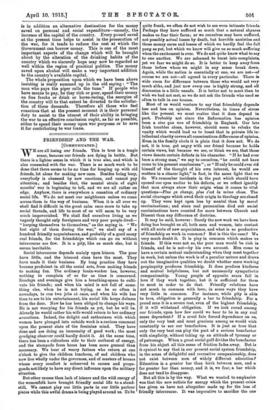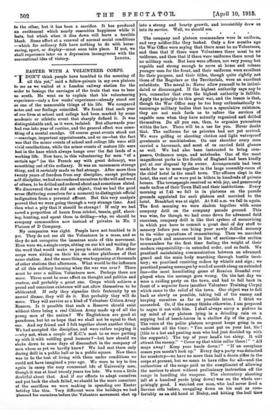W E are all losing our friends. This is true in
a tragic sense, because our friends are dying in battle. But there is a lighter sense in which it is true also, and which is
also connected with the war. There is so much work to be done that there seems to be no time for keeping up with old friends, let alone for making new ones. Besides being busy, everybody is obsessed by new emotions, and cannot pay attention; and besides that, the mental strain of eight months' war is beginning to tell, and we are all rather on edge. Anyhow, there is everywhere a cessation of ordinary social life. We do not meet our neighbours unless we come across them in the way of business. When it is all over we shall find it difficult in the great calm once more to take up social threads, and life to most of us will seem to be very much impoverished. We shall find ourselves living as we vaguely thought only foreigners and very poor people lived- " keeping themselves to themselves," as the saying is. "We lost sight of them during the war," we shall say of a hundred friendly acquaintances, and probably of a good many real friends, for the friendships which can go on without intercourse are few. It is a pity, like so much else, but it seems inevitable.
Social intercourse depends mainly upon leisure. The poor have little, and the leisured class have the most. They have made it their business. By long practice they have become proficient in all the social arts, from making friends to making fun. The ordinary brain-worker has, however, nothing to complain of so far as time is concerned. Sundays and evenings give him a breathing-space to culti- vate his friends; and when his mind is not full of some- thing else, when he is not trying, as he so often is nowadays, to run two jobs at once, and when his wife has time to see to his entertainment, his social life keeps dulness from the door. Now he has been obliged to change his ways. He is not wearying for his friends as yet, but he will be. Already he would rather his wife would return to her ordinary avocations. Indeed, the delight and enthusiasm with which women have plunged into outside work is a curious comment upon the present state of the feminine mind. They have done and are doing an immensity of good work, the most grudging observer could hardly doubt it. At the same time, there has been a ridiculous side to their outburst of energy, and the stampede from home has been more general than necessary. We hear of weary fathers who return at one o'clock to give the children luncheon, of sad children who now live wholly under the governess, and of masters of !mimes whose every comfort is subserved to causes and propa- ganda not likely to have any direct influence upon the military situation.
But other causes than lack of leisure and the wild energy of the womenfolk have brought friendly social life to a stand- atilt. We cannot play our little parts in our little parlour pieces while this awful drama is being played around us. To be
quite frank, we often do not wish to see even intimate friends. Perhaps they have suffered so much that a natural shyness makes us fear their faces; or we ourselves may have suffered. not possibly actual losses by death, but horrible anxieties and those money cares and losses of which we hardly feel the full pang as yet, but which we know will give us so much suffering when the excitement is over. We do not quite know what to say to one another. We are ashamed to burst into complaints. yet we fear we might do so. It is better to keep away from those before whom we might in any -sense break down. Again, while the nation is essentially at one, we are not—of course we are not—all agreed in every particular. There is wide room for difference between those who would act very much alike, and just now every one is highly strung, and all discussion is a little unsafe. It is better not to meet than to wish we had not met, so we do not ask the friends who used so often to talk in our houses.
Most of us would venture to say that friendship depends less and less on opinion. Nevertheless, in times of stress like the present we must realize that it does depend in part. Probably not since the Reformation has opinion been a sine qua non of friendship in England. Our late Irish troubles alone, however, should seem to rebuke the vanity which would lead us to boast that in private life in- tellectual charity covers all conscientious differences of opinion. Even in the family circle it is plain that it does not. We do not, it is true, get angry with our friend because he holds certain views, but because we see, or think we see, that those views denote certain defects in his character. "If he had ever been a strong man," we say to ourselves, "he could not have come to his present conclusions " ; or "If only he could ever rid himself of the thought of his own interest, he would see matters in a clearer light," in fact, in the same light that we do. We remember incidents in the past which should have opened our eyes earlier to his defects, or we reflect ignobly that men always show their origin when it comes to vital questions—Plus pa change, plus c'esi la tante chose. The social cleavages which owed their origin to theology are closed up. They were kept open less by mental than by moral recriminations ; and since real persecution died out social recriminations have counted for more between Church and. Dissent than any difference of doctrine.
It may be said, however, Surely the new work we have been doing has brought us all, both men and women, into contact with all sorts of new acquaintance, and what is so productive of friendship as work in common P But is this the case P We very much doubt its It is play in common which makes t15 friends. If this were not so, the poor man would be rich in friends, and he is not—by his own account. Men come to have a certain mutual understanding when they meet together in work, but unlese the work is of a peculiar nature and draws out the imaginative qualities we doubt whether mere working propinquity produces friendship. It does produce kindness and mutual helpfulness, but not necessarily sympathetic companionship. Young people of opposite sexes fall in love if they work together, but it is sufficient for them to meet in order to do that. Friendly relations have not much in common with love; in some ways they have very little in common. For instance, while pity is akin to love, obligation is generally a bar to friendship. For
proud man it is a severe test, even of the highest friendship, if it will withstand obligation. If we look round among our friends, upon how few could we bear to be in any real sense dependent P If a cruel fate forced dependence on us, only the very best and most gracious among us would wish constantly to ass our benefactors. It is just as true that only the very best can play the part of a serious benefactor with simplicity, without taking up an attitude of tyranny or of patronage. When a great social gulf divides the benefactor from his object all this sense of friction fades away. But is it cynical to say that in our present social system friendship,
in the sense of delightful and recreative companionship, does not exist between men of widely different education? Education is a greater bar than birth between men, and a far greater bar than money, and it is, we fear, a bar which does not tend to disappear.
But all this is by the way. What we wanted to emphasize was that the new outlets for energy which the present crisis has given us have not altogether made up for the loss of friendly intercourse. It was imperative to sacrifice the one to the other, but it has been a sacrifice. It has produced an excitement which nearly resembles happiness while it Mats, but which when it dies down will leave a terrible blank. Some effort at a renewal of normal social conditions —which for ordinary folk have nothing to do with horse. racing, sport, or display—moat soon take place. If not, we shall experience later on a depression incongruous with the







































 Previous page
Previous page